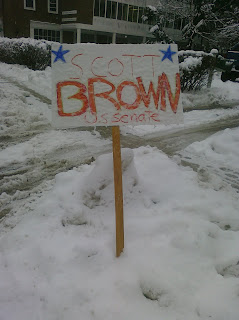
The numbers are in, and they add up to the biggest election story in Massachusetts in at least 18 years, and a huge national story, to boot.
Scott Brown has won a seat in the United States Senate, the first Massachusetts Republican to do so since 1972. That's 37 years, but who's counting?
When driving past a polling place today, I saw the sign pictured above; that image, to me, captures what happened in this race. Over the past two weeks, particularly, average voters realized that their vote mattered and that they could "send a message" to Democrats, to the President, to every incumbent, and to all of Washington. Citizens who had never been involved got out, voted, and volunteered. Someone made the sign above. I wonder, did they try to get an "official" and professionally printed Brown sign? Was the Brown campaign out of signs? Or did that someone just hit on last minute inspiration to get involved? Whatever the answers, they were good news for Scott Brown.
So, let the analysis begin, and there will be a great deal of it. There are, to be sure, lessons to be learned.
Certainly I suggest that Democrats should learn that "not being George Bush" isn't enough to win. They have to have an agenda, and it must be an agenda the people support. The only Democrat agenda in this race was that of Barack Obama, and its support has dwindled. Martha Coakley failed to communicate a single positive message about her vision. Scott Brown did so articulately and well. Voters chose the clear vision and agenda over the candidate who only seemed to run negative ads about Dick Cheney and Sarah Palin.
As if getting run over by the Brown Freight Train isn't bad enough, Martha Coakley had better be ready to be thrown under the bus by Washington Democrats, who will not want the race to be seen as a negative referendum on them or their agenda.
Amid rumors that the administration and Congressional leadership had already been discussing a "Plan B" in the event of a Brown victory, President Obama's Press Secretary, Robert Gibbs, today signaled that Obama will distance himself from Coakley and look to blame the candidate, not the political environment created by his agenda.
In an Associated Press story published by the New York Post, when Gibbs was "asked by CBS News correspondent Chip Reid whether the president had expressed any surprise or frustration about the closeness of the race in Massachusetts, Gibbs admitted that Obama was not happy with the current state of play in the Bay state. 'Yes. He was both surprised and frustrated,' Gibbs told the assembled reporters at the daily White House briefing. Asked if the president was angry, Gibbs replied: 'He’s not pleased.'”
That's too bad. Obama and the Democrats would be well served to look at the results of this race and discover what they might learn; how they might adjust to serve the people who elected them. If Massachusetts voters are disenchanted enough to elect a Republican Senator to succeed Ted Kennedy, then any Democrat currently "serving" in Washington can be defeated. They would all do well to listen and adapt, rather then blame Coakley individually for a bad campaign and arrogantly push through whatever they please.
This is not to say that Martha Coakley ran a good campaign. She didn't. Democrats would do well, however, to realize that failure, like success, has lots of parents, and the Obama Agenda and Washington Democrats all had a hand in this loss.
Republicans, too, could learn from this. Scott Brown worked hard and ran a fine campaign. He also benefited from timing, in that voters were ready for his message, but he created some of that openness, too. Brown's victory does not mean that any Republican can win in 2010 or 2012; what it means is that an intelligent, good Republican candidate can win by working hard and earning the victory.
There will be plenty of time for analysis. But tonight, for those who are paying attention, there has been a Scott heard 'round the world.
No comments:
Post a Comment